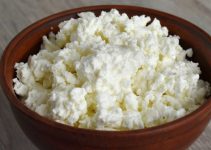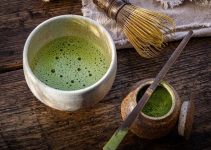This spice is one of the healthiest in the world, and today I’m going to show you the main health benefits of ginger.
It is rich in antioxidants, vitamins A, B6, C & E, potassium, calcium, magnesium & selenium.
One of the most famous uses of ginger is to soothe stomach ailments such as nausea and motion sickness.
Ginger also helps lessen pain from arthritis and fibromyalgia, as well as headaches and muscle aches.
So read on to discover all the health benefits of ginger and why you should consume it.
Health Benefits of Ginger

1. Contains Potent Medicinal Properties
Gingerol, the active ingredient in ginger, is a potent anti-inflammatory and antioxidant.
Researchers have found that the antioxidant compound gingerol may help reduce oxidative stress, resulting from excess free radicals in the body.
Ginger also calms nausea and helps with digestive problems. In addition, some research suggests that ginger may be effective for the treatment of cancer.
It’s important to note that not all gingerol-containing foods are equal in terms of their levels of efficacy.
2. Could Aid in Weight Loss
There were 14 studies included in the meta-analysis. A total of 473 subjects participated.
The results showed that ginger supplements significantly decreased body weight.
Another study in rats showed that the consumption of Ethanolic Extract of Ginger reduced blood sugar levels.
In addition, ginger has been shown to reduce hyper-lipidation by decreasing both cholesterol and triglycerides.
Studies have shown that ginger supplements can improve fatty liver and insulin resistance caused by fructose in rats.
In a study, researchers found ginger consumption to increase thermogenesis in the body and reduce feelings of hunger.
Ginger could have a potential role in weight management.
More research will be needed to confirm these findings.
3. May Help Fight Nonalcoholic Fatty Liver Disease (NAFLD)
Nonalcoholic fatty liver disease (NAFLD) is a common chronic liver disease in obese people and type II diabetics.
There is no proven medical treatment for this particular disorder, but you can try a healthy lifestyle, modify your diet and try doing some exercise. Researchers have found this to be helpful for some people.
Ginger might help combat fatty liver by activating the metabolism and speeding up the body’s natural fat-burning process.
Research shows that it helps to reduce inflammation, improves cholesterol levels, and balances blood sugar.
One study found that ginger reduced inflammatory factors resulting in an improvement in nonalcoholic fatty liver disease (NAFLD).
4. Lessen Menstrual Cramps (dysmenorrhea)
Dysmenorrhea is the medical term for painful menstruation.
The severity of pain varies from person to person, but many women describe it as severe cramping in the lower abdomen and backache.
Four trials demonstrated that ginger’s effects on pain relief were comparable to other medications such as mefenamic acid, ibuprofen, and zinc sulfate.
Three trials adopted a placebo as a control group, reporting pain reduction by the level of visual analog scale.
For example, Rahnama et al. reported that ginger significantly improved primary dysmenorrhea in ginger-treated patients for five days, beginning two days before the onset of menstruation.
5. May Help Reduce Nausea and Morning Sickness
Ginger has been used to treat nausea and morning sickness.
The health benefits of ginger are staggering.
It is a potent anti-inflammatory and antioxidant which can help reduce inflammation-causing molecules, decrease oxidative stress, and improve cognitive function.
6. Can Help to treat inflammation & arthritis
Treating inflammation is one of the most appreciated health benefits of ginger.
Studies show that ginger supplements provide anti-inflammatory effects. From there, most studies have been conducted on arthritis-related diseases.
Mainly osteoarthritis is one of the many chronic ailments that ginger can improve.
Regarding OA, six studies investigated the efficiency of the constituents of ginger that serve as anti-inflammatory agents.
All studies reported improvement following ginger intake compared to the control group.
7. May Reduce Intestinal Cramping
Ginger can reduce the symptoms of intestinal cramps because it contains chemicals like gingerols and shogaols, which have anti-inflammatory properties.
8. May Help Reduce Flatulence
Flatulence is defined as a sudden release of intestinal gas through the rectum, typically audible to humans.
Flatulence is the visible manifestation of bacterial fermentation of indigestible carbohydrates.
Ginger may seem like an unlikely solution, but studies have found that it helps reduce flatulence by calming the gut.
9. May Help Gastric Emptying and Dyspepsia
Gastric emptying and dyspepsia are other important health benefits of ginger and you can benefit from them.
Dyspepsia is the feeling of discomfort in the upper middle part of your abdomen. This feeling can come and go, but often it is persistent. You might feel as satiated after eating a meal as if you couldn’t eat another bite.
Dyspepsia can result from several different conditions, including ulcers, gastritis, hiatus hernia, and certain types of cancer.
Ginger is excellent for the gut. It helps relieve symptoms of bloating and gas, offers a natural carminative effect, and prevents dyspepsia, flatulence, and bloating.
10. Can Help With Osteoarthritis
Research has shown that ginger can decrease inflammation and pain associated with osteoarthritis.
It also increases the mobility of joints in those suffering from this chronic condition.
One study found that osteoarthritis patients who took ginger for four weeks showed a reduction in gastrointestinal pain.
The same study found that ginger significantly reduced pain for people with arthritis on standing & moving, making it as effective as Diclofenac at treating pain, with a much lower chance of side effects.
11. Can Help With Diabetes
A study was conducted to look into the effects of ginger on blood sugar, hematocrit level, and other indicators.
This study should help us better understand how this widely used spice could influence people with diabetes.
In a clinical trial including 41 patients with diabetes type 2, they were randomly assigned to ginger or placebo groups—Twenty-two people in the ginger group and 19 in the control group.
They consume 2 grams of ginger powder every day or a placebo for a total length of 12 weeks.
They received two g/day of ginger powder supplement or lactose as a placebo for 12 weeks.
Ginger supplementation helped reduce fasting blood sugar levels, Apolipoprotein B/apolipoprotein A-I, Hemoglobin A1c, Apolipoprotein B, and Malondialdehyde in the ginger group compared with the control group. At the same time, it increased the level of apolipoprotein A-I.
Ginger powder supplements taken by mouth might help people with high fasting blood sugar in type 2 diabetic patients.
So it may have a role in alleviating the risk of some chronic complications of diabetes.
12. Can Help Treat Chronic Indigestion
Several factors can produce indigestion, and it is often very complicated to heal.
Anecdotally, ginger might accelerate the process and combat indigestion.
According to a study published in “Digestive Diseases and Sciences,” ginger might be able to alleviate the symptoms of chronic indigestion.
This study observed eighty-six participants with chronic heartburn and indigestion for eight weeks.
The participants were randomly assigned to receive either two grams of powdered ginger or two grams of placebo powder every day before each meal.
Ginger might help treat chronic indigestion because it stimulates digestion by increasing stomach acid production while reducing muscle spasms.
13. May Help Lower Blood Sugars Levels
Research is showing that ginger may also be able to lower blood sugar levels.
A new study published in the Journal of Nutrition and Metabolism found that ginger supplements can help regulate glucose metabolism by suppressing gluconeogenesis and increasing insulin production.
Researchers gave participants 500 mg of powdered ginger or a placebo at breakfast for eight weeks.
They found that the ginger group had significantly lower fasting blood glucose levels and HbA1C levels compared to the placebo group.
14. May Help Improve Heart Health
Ginger contains a chemical called gingerol, which, according to scientific research, may provide cardioprotective effects.
A study found daily consumption of ginger might decrease the risk of hypertension.
Few other studies are investigating the health benefits of ginger, but promising results have been found in animal models.
These studies showed that ginger consumption improved heart health and decreased the risk of heart disease.
Ginger consumption has been linked to a reduction in blood pressure.
Ginger is thought to inhibit the angiotensin-converting enzyme, an enzyme released by the body that helps regulate blood pressure.
15. Can Treat Nausea and Vomiting of Pregnancy (NVP)
Pregnancy is the most common cause of nausea and vomiting.
Up to 80% of women experience these symptoms during their first three months of being pregnant, which come in the form of either morning sickness or hyperemesis gravidarum.
Hyperemesis gravidarum is also known as nausea and vomiting of pregnancy (NVP).
Pregnant women may experience nausea and vomit, leading to significant damaging effects such as malnutrition, dehydration, and weight loss.
Ginger has been extensively studied over the past 30 years to examine its safety and efficacy in treating nausea and vomiting.
Studies found that ginger at a dose of 1 g/day effectively prevents and treats pregnancy nausea and vomiting with no significant side effects.
Other studies found that ginger showed significant effects in the control of nausea and vomiting during pregnancy.
Eight out of 14 studies revealed that the effects were significant for ginger.
Research shows that ginger can have the same effect as other types of medication such as vitamin B6 (Pyridoxine), Antihistamine, or Metoclopramide.
Besides, a study by Ensiyeh et al. concluded that ginger is more effective than vitamin B6 relieving the severity of nausea.
16. Can help With Cold and Flu Prevention and Treatment
Ginger has anti-inflammatory properties, leading to relieve sore joints and muscles.
It is also a potent antioxidant that can help the body to fight harmful free radicals.
The problem is that ginger can taste bad when taken unprocessed, and cooking it can lose some of its nutritional value.
So what’s the solution?
Well, there are many ways you can use ginger to make your life easier!
One option is to take a ginger pill supplement.
This way, you get all the benefits of ginger without having to taste or cook it!
17. May Help Fight Free Radicals
Ginger is a potent antioxidant. It can fight free radicals and prevent cellular damage.
Studies have shown that ginger has the power to inhibit proteins called cyclooxygenase-2 (COX-2) and 5 Lipoxygenase (5LOX) that are essential for the development of cancerous cells.
Ginger also increases blood flow while decreasing inflammation and oxidative stress in the body.
These qualities make ginger a valuable tool in preventing heart disease, diabetes, arthritis, Alzheimer’s disease, asthma, and many other inflammatory conditions.
18. May Help Lower Bad Cholesterol Levels
Ginger might be a helpful tool to help lower cholesterol naturally.
The evidence of ginger’s effect on cholesterol levels is limited but still promising.
Studies in humans and animals have found that just one gram of ginger per day can reduce LDL cholesterol levels by 15% in just two weeks.
A study found that people who ate ginger had lower total cholesterol levels and triglycerides than those who didn’t.
Another study found that ginger reduces unhealthy cholesterol levels and increases good cholesterol.
19. May Improve Brain Function and Protect Against Alzheimer’s Disease
Many of the health benefits of ginger have been proven by science in this decade.
Ginger has been shown to have many health benefits, such as improving brain function and protecting against Alzheimer’s disease.
Ginger contains organic compounds called gingerols which promote healthy blood circulation, protect against Alzheimer’s disease, and stimulate brain function.
It is believed that the antioxidants and bioactive compounds in ginger can inhibit inflammatory responses that occur in the brain.
Ginger has been shown to enhance brain function.
A 2012 study involving middle-aged women showed that taking daily ginger extract improved reaction time and working memory.
Studies in animals have shown that ginger can help prevent the age-related decline of the brain.
20. Can Fight Infections
Ginger has been used to help fight infections for a long time.
Studies have shown that ginger extract can inhibit the growth of many different types of bacteria, such as Escherichia coli and Staphylococcus aureus.
Ginger is a natural spice that can fight bacteria. This substance has efficient anti-bacterial properties against various drug-resistant clinical pathogens and can prevent diseases caused by drug-resistant microbes.
A study found a notable increase in the effectiveness of ginger against bacteria linked to inflammation of gums (Gingivitis) and periodontal disease (Periodontitis).





